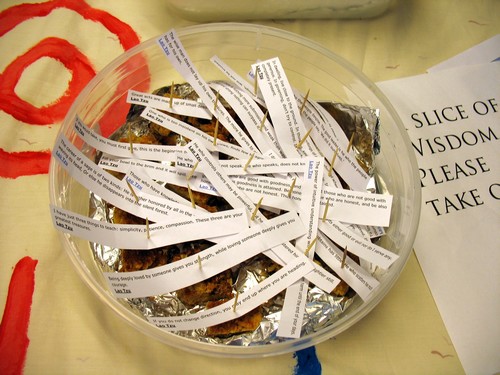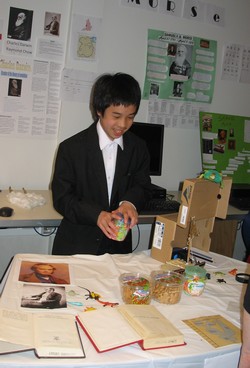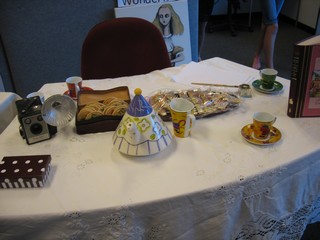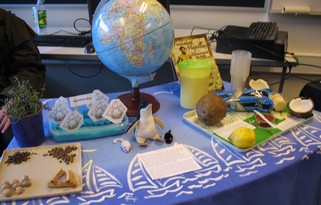Wow, 7E! Your displays last night inspired and impressed me. I felt proud to know you. Here are just a few pictures. Remember that I can only publish with permission, so next week when I return we might have a slide show of all my other photos.
By the way, there is some work for you all at the bottom of these photos. It’s about the history of the English language. Feel free to use your i-pod earphones to listen to how our language sounded 1200 years ago. It’s spooky because you won’t be able to understand it, yet it’s just a little bit familiar too.
 Sam’s “slices of wisdom” from Lao Tzu – tasty and topical. Well done, Sam! Sam’s “slices of wisdom” from Lao Tzu – tasty and topical. Well done, Sam! |
  Emma, Rachel and Mason, looking very much at home in their costumes Emma, Rachel and Mason, looking very much at home in their costumes |
Steven’s brilliant question box for his display on Ferdinand Magellan. His gruesome stories of the exploits of Magellan (especially the bits about maggots, rats and sawdust), held many listeners spellbound, including me.
|
 Raymond puts some finishing touches to his display Raymond puts some finishing touches to his display |
 Claire told me that her favourite part of Alice in Wonderland is the Mad Hatter’s tea party. It’s no wonder that her display had some quirky and colourful crockery that caught my eye. Claire told me that her favourite part of Alice in Wonderland is the Mad Hatter’s tea party. It’s no wonder that her display had some quirky and colourful crockery that caught my eye. |
 From www.gutenberg.net(allowed to be used freely); the inscription says, “God spede ye plow and send us Korne enow”.
From www.gutenberg.net(allowed to be used freely); the inscription says, “God spede ye plow and send us Korne enow”.
*************************************************************
- Why is Wednesday spelt so strangely?
- Why are English and German so similar in many ways?
- Why are Christmas and Easter actually celebrated on the dates of pagan festivals?
The Anglo-Saxons provide the answer to all these riddles.
They were brilliant at riddles themselves. Nearly a hundred of their riddles have come down to us. Here’s an example for you to try to solve. It is from http://www.abdn.ac.uk/english/beowulf/riddle.htm, where you can read others later if you have time.
A Riddle
Wounded by iron weapons and scarred by swords.
I often see battle.
I am tired of fighting.
I do not expect to be allowed to retire from warfare
Before I am completely done for.
At the wall of the city, I am knocked about
And bitten again and again.
Hard edged things made by the blacksmith’s hammer attack me.
Each time I wait for something worse.
I have never been able to find a doctor who could make me better
Or give me medicine made from herbs.
Instead the sword gashes all over me grow bigger day and night.

Helmet found at Sutton Hoo
Now, Some History…
When the Roman legions began to pull out of Britain in 410AD, the native Britons were placed in a precarious and untenable position. For hundreds of years they had had the most powerful military force in the world to protect them. Quite suddenly, that force was gone. They hoped that the Angles, Saxons and Jutes, Germanic tribes, would protect them from the Picts and Scots in the north who were disturbingly eager to overrun them.
Whoops! This turned out to be a bad idea. Starting in 449AD, the Angles, Saxons and Jutes came and, liking what they saw, they stayed. Many Britons withdrew to Cornwall and Wales.
So why learn about these relatively remote Germanic tribes who decided to take over this small green island?
Well, they gave us our language. Sure, as time passed the English borrowed many words from other groups, including the Christian missionaries who brought Latin, the Vikings who contributed Old Norse, the Normans, who gave us many French words, and many others.
But the soul of the English language, the words that are the building blocks, the words that are learned by English speaking children at their mother’s (or father’s) knee, the words that are used in every sentence of English (including the word English itself) are nearly all from the Anglo-Saxons, as they came to be called.
Listen to Old English on the Ages of English Timeline at the trusty BBC website below. You will need to use your earphones. It sounds quite different from modern English, more German perhaps, and it is almost completely incomprehensible. And yet…every now and then, a word or a short sentence sounds very much the same. If you listen to the sound of the words rather than the words themselves, it can seem strangely familiar.
Listen, for instance, to the short passage from Beowulf at the site below, by clicking on the microphone and scroll picture. The last four words of this passage sound very familiar indeed.
SPOOKY!
AGES of English TIMELINE LINK
http://www.bbc.co.uk/history/british/launch_tl_ages_english.shtml
(First click on the ? on the top right so that you know how to use the timeline.)
YOUR TASK: Create a Word file titled: The Ages of English
1. List the four days of the week that have come to us from the Anglo-Saxons and the four gods whose names they commemorate. (To find this out, click on Act 1, the beer mug.)
2. What kind of writing did the Anglo-Saxons initially use? What influenced them to change over to the Latin alphabet and what were some words of Latin origin that came into use at this time?
3. Listen carefully to the Old English words of the Anchor Riddle by clicking on the jester figure. Try making up a riddle using the same style (but of course in modern English). Write it in your document and if it is clever enough to share, copy it into a comment for others to read.

 Jack looking seriously authentic!
Jack looking seriously authentic!


I missed out on the night it looked like real fun 🙁
I wonder wat Jack was 😀
Will there be one next year?
If there is i’m Comming! 😀